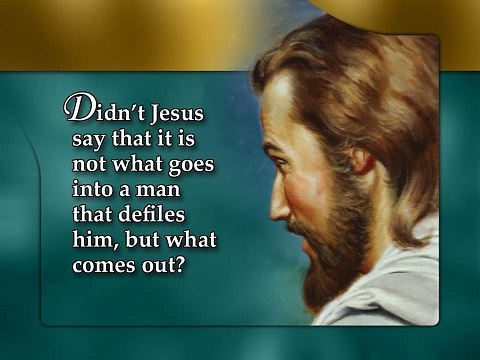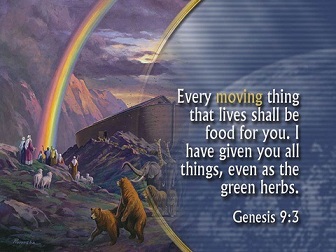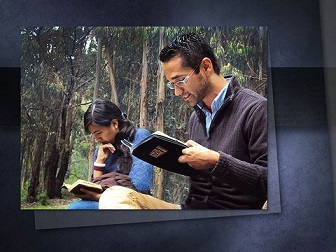
'Not that which goeth into the mouth defileth a man; but that which cometh out of the mouth, this defileth a man': an exposition on Christ's words in Matthew 15:11

Samuel Smith
23 Jan'19
5
LESSON 5
NOT THAT WHICH GOETH INTO THE MOUTH DEFILETH A MAN; BUT THAT WHICH COMETH OUT OF THE MOUTH, THIS DEFILETH A MAN: AN EXPOSITION ON CHRIST'S WORDS IN MATTHEW 15:11
You are welcome to another edition of Insights from God's Word, a Bible study programme that is committed to sharing God's Word by allowing the Bible to speak for itself. In this edition, we continue with our series on How to Prosper in Health. The topic for this study is: "Not that which goeth into the mouth defileth a man; but that which cometh out of the mouth, this defileth a man": an exposition on Christ's words inFriends, the passage of
1) The issue that the religious leaders confronted Christ with had to do with outward washing ceremonies before eating.
2) The food in context is bread and not flesh food.
With these two points clearly fixed in our mind, we can now progress comfortably into the passage of
When Christ was through with the scribes and Pharisees, He called the multitude closer to Himself and said: "10 ... hear and understand: 11 Not that which goeth into the mouth defileth a man; but that which cometh out of the mouth, this defileth a man" (
15:16 And Jesus said, Are ye also yet without understanding?
15:17 Do not ye yet understand, that whatsoever entereth in at the mouth goeth into the belly, and is cast out into the draught? (It is important to note that in this text, Christ was referring to clean food such as bread as the context depicts and not unclean food)
15:18 But those things which proceed out of the mouth come forth from the heart; and they defile the man.
15:19 For out of the heart proceed evil thoughts, murders, adulteries, fornications, thefts, false witness, blasphemies:
15:20 These are the things which defile a man: BUT TO EAT WITH UNWASHEN HANDS DEFILETH NOT A MAN."
(
7:4 And when they come from the market, EXCEPT THEY WASH, they eat not. And many other things there be, which they have received to hold, AS THE WASHING OF CUPS, AND POTS, BRASEN VESSELS, AND OF TABLES.
7:5 Then the Pharisees and scribes asked him, Why walk not thy disciples according to the tradition of the elders, BUT EAT BREAD WITH UNWASHEN HANDS?"
(
Beloved, if one should carefully go through the entire passages of
Such people utilise the passage of
7:19 Because it entereth not into his heart, but into the belly, and goeth out into the draught, PURGING ALL MEATS?"
(
The question "purging all meats?" is a very deep question through which I believe Christ affirmed the perpetuity of the dietary law as against the outward ceremonies of unnecessary hand washing customs. It is however sad to observe that some modern translations of Scripture (such as the NIV, RSV, NLT and GNT), which follow the dynamic view of interpretation have specialized in twisting key words in the original texts, thus making clear Bible passages seem confusing. To protect yourself from being deceived by inaccurate translations, I will encourage you to compare various literal and dynamic translations as you seek to understand various passages of Scripture. In doing this, you will be treading on safer grounds.
Friends, from the scriptural passages we have reviewed so far, it is clear that texts of
Exhortation: "For the LORD God is a sun and shield: the LORD will give grace and glory: no good thing will he withhold from them that walk uprightly. O LORD of hosts, blessed is the man that trusteth in thee" (
In our next study, we will consider the topic: "What God hath cleansed, that call not thou common": an exposition on Peter's vision in
Stay blessed and keep shining for King Jesus.
Maranatha!
Powered by White Throne Ministries














